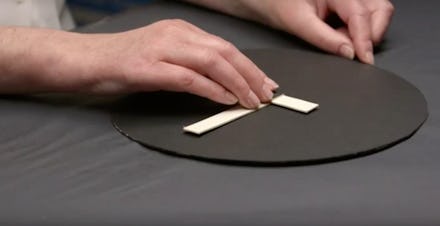For a Woman With a Bionic Eye, Performing This Small Act Was Like "Christmas"

"Oh my god," said Rhian Lewis, 49, when she first read that the cardboard clock in front of her said 3:00. "Honest to God, that felt like Christmas Day."
It may sound like a small feat, but for Lewis, who lives in Cardiff, Wales, it was a momentous occasion. She has suffered from retinitis pigmentosa, a hereditary disease that causes retinal degeneration and gradual vision deterioration, since the age of 5. But thanks to a groundbreaking procedure, Lewis now has a bionic eye — and her vision has started to return.
Lewis received the bionic eye in June. Her operation was carried out by surgeons at Oxford University's Eye Hospital, and the implant itself is the creation of Retina Implant AG, a German medical technology startup. Lewis is the first person outside of Germany to receive the implant, according to the Guardian.
The bionic eye is made up of a 3-inch-by-3-inch millimeter chip loaded with about 1,500 light sensors that send electrical signals to nerve endings. It's linked with a minuscule computer implanted underneath the skin behind the ear. Lewis is one of six patients participating in a clinical trial at Oxford's John Radcliffe hospital, and the first of the group to go under the knife.
"I don't go out and about on my own, ever," Lewis told the BBC of retinitis pigmentosa's impact on her life. "Then around the house, the kitchen, you rely on other people to find things for you — it's very frustrating. ... And I've got friends now where I've got no idea what they look like. And I certainly don't know how I've aged."
After the surgery, doctors performed a series of tests to see whether the procedure worked. Though Lewis passed the first test — detecting flashing lights on a computer screen — she didn't fare as well with the second, which involved identifying a white plate set on a black tablecloth. The next day, however, when she tried it again, she was able to complete the task.
"They did the objects on the table and I could get them and I was so chuffed, I must have looked like a kid at Christmas!" she told the BBC. "I was just locating a plate, a cup and a couple of shapes, but it was difficult because I didn't have any coordination. I haven't seen anything through that eye for so long, so I kept overshooting it a little bit — but we were getting there. I was just elated, really elated."
She told the BBC that she was "terrified" about venturing outdoors, but the delight of seeing things she hadn't seen in years turned out to be well worth the feelings of trepidation.
"There was a car, a silver car, and I couldn't believe it, because the signal was really strong and that was the sun shining on the silver car. And I was just, well, I was just so excited, I was quite teary!"
According to experts, the the innovation's miraculousness of is a sight to behold — literally.
"It's an amazing process because what Rhian and others are trying to do is reactivate a part of the brain that hasn't been doing anything for the last 10 years or so," Robert MacLaren, the professor heading up the bionic eye research at Oxford University, told the Guardian. "There is a lot of rehabilitation because basically they are learning to see again."
For patients like Lewis, however, the benefits are shifting the most elemental parts of their lives for the better.
"It's been maybe eight years that I've had any sort of idea of what my children look like," she said, according to the Guardian. "Now, when I locate something, especially like a spoon or a fork on the table, it's pure elation. I just get so excited that I've got something right."